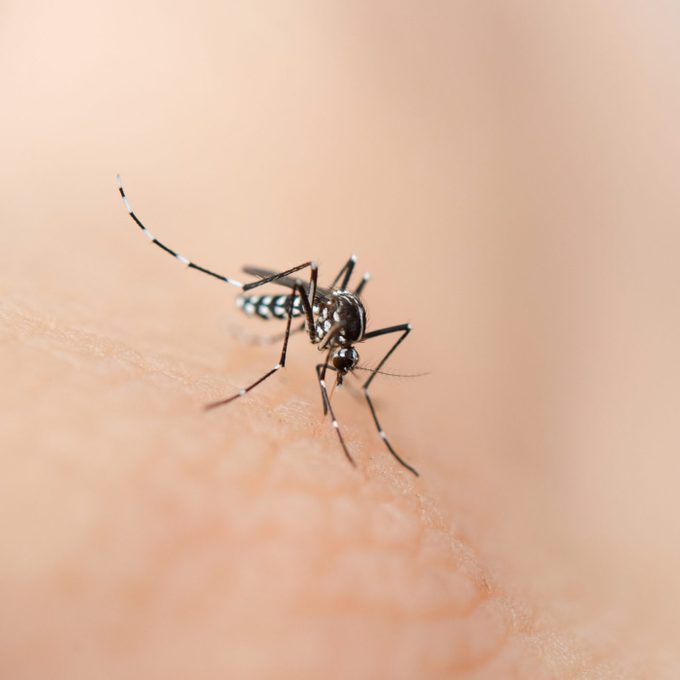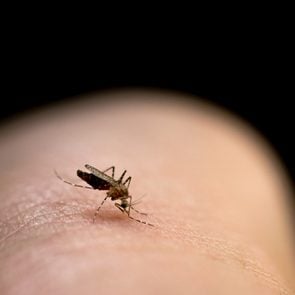Can Mosquitoes Transmit Coronavirus?
Updated: Sep. 10, 2020
Mosquitoes can transmit many diseases but current evidence suggests that Covid-19 isn't one of them. Still, it's important to take measures to prevent mosquito bites.
Mosquitoes are known to transmit many diseases, including Zika virus, West Nile virus, dengue fever, and others, but Covid-19 is likely not on this list.
At this point, there’s nothing to suggest that mosquitoes can transmit coronavirus, according to the World Health Organization. Covid-19 is a respiratory virus, and the main mode of transmission is via viral droplets released into the air when an infected person coughs, sneezes, speaks, or breathes without a face mask.
“A mosquito can ingest a pathogen such as a viral particle which then travels to its stomach,” explains Yesim Tozan, PhD, assistant professor of global health at NYU School of Global Public Health in New York City. “If the virus is able to replicate inside the mosquito, it can spread to its head and if, and only if, the virus reaches the mosquito’s salivary glands and saliva, can it be transmitted to humans the next time the mosquito bites when saliva is injected with the virus particles.”
In simpler terms, the virus must survive the digestive process, replicate within the mosquito, and pass through the gut wall to reach its salivary glands.
The good news, says Tozan, is that there is no evidence of this ever occurring with any SARS virus, including Covid-19. Even under extreme conditions, the novel coronavirus can’t replicate in mosquitoes and can’t be transmitted to people even if the mosquito has encountered the virus, according to research in three different types of mosquitoes that appears in a July 2020 issue of Nature. (That’s good news if you’re worried about getting coronavirus again.)
“The Covid-19 virus as well as the closely related SARS-CoV and MERS viruses that we encountered years ago do not replicate efficiently in the mosquito and therefore, even if transmitted in a bite, the viral load would be very small—too small to cause disease,” says Coby Schal, PhD, professor of entomology and plant pathology at North Carolina State University.
There’s more to it too, he says. “Humans do not produce high levels of Covid-19 in the blood: Typical mosquito-borne viruses such as dengue and yellow fever, occur in human blood.”

Mosquitoes spread disease
There are several diseases you can get from mosquitoes, some of which can be deadly, says Schal. For example, the yellow fever mosquito (Aedes aegypti), which lives in southern Florida and Louisiana in the U.S., can carry Zika virus, chikungunya, dengue, and other viruses, he says.
Some resource-poor countries are experiencing a surge in rates of dengue fever, and this is linked to Covid-19, Tozan says. “Countries shifted their resources to help reduce risk of Covid-19, and as a result, there was a rise in dengue fever, because there wasn’t enough funding to go around.”
Unfortunately, no vaccines or specific medicines are available to treat many viruses spread by mosquitoes, the Centers for Disease Control and Prevention (CDC) points out. It’s important to protect yourself from mosquitoes, especially during their “on” seasons.
When spending time outdoors, use an (EPA)-registered insect repellent with one of these active ingredients—DEET, picaridin, IR3535, oil of lemon eucalyptus, Para-menthane-diol, or 2-undecanone. (Here are some other things mosquitoes despise that can keep them at bay.)
Wearing long-sleeved shirts and long pants when outside also can help stave off mosquito bites. Sometimes they feast when you’re in bed, so it’s key to prevent mosquito bites while you sleep.
Next up: Although they’re both itchy, there’s a difference between mosquito bites and flea bites. You can get relief with these 11 expert-approved anti-itch creams.
















